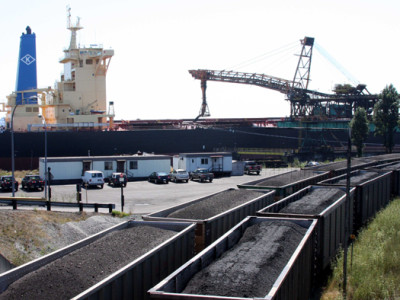Anti-CEQA Lobbyists Turn to Empirical Analysis, But Are Their Conclusions Sound?
Influential Attacks on California's Environmental Impact Law Aren't Supported By the Data
Every August, as the California legislative session comes to a head, lobbyists attempt to gain support for dramatically scaling back California’s landmark environmental law, CEQA (the California Environmental Quality Act). This year was no exception. Last month, the law firm Holland and Knight, which has been a leading force on this issue, issued a new report designed to gain support for dramatic changes to the law. The report assembles a nearly-complete census o...
CONTINUE READINGLast Week in Climate Change
Is climate action finally starting to develop momentum?
There was some good news last week for those of us who worry about the future of the planet,. Both inside and outside of Congress, Pope Francis spoke about the need to protect the environment and address climate change. Some conservative Catholics are eager to dismiss this as simply another misguided opinion by a left-learning Pope. But his predecessor, Pope Benedict, also spoke out on climate change, as we reported a couple of years ago. There were other notabl...
CONTINUE READINGMixed results in CA medical marijuana legislation
New state law to regulate medical marijuana makes important environmental progress, still much to be done
California is moving towards marijuana legalization. This is a good and important thing for a whole host of reasons, but one important reason is the environmental impact of unregulated and illegal marijuana cultivation on the environment – something that has been discussed both in the news and here on Legal Planet. Those impacts include diversion of water for irrigation (harming fish runs and even endangering community water supplies); the use of toxic chemicals for pe...
CONTINUE READINGPope Francis Goes to Washington
What he said and didn’t say
Pope Francis arrived in Washington, D.C. on Tuesday to begin a much anticipated trip to the United States. While here, the pope will visit DC, New York City, and Philadelphia. Pope Francis, a former chemist, has gained much attention for his calls for action on climate change, in addition to his focus on inequality and poverty. The pope often frames climate change as a moral issue, pointing to the fact that the poorest countries and the most marginalized people will be t...
CONTINUE READINGThe Sustainable Development Goals (SDGs)
Ambitious international targets for sustainability
From September 25-27, the UN is hosting the high-level Sustainable Development Summit and, assuming all goes according to plan, adopting the Sustainable Development Goals (SDGs). The result of years of negotiation with dedicated efforts at transparency and inclusion, the SDGs are a big deal in the international development community. They represent ambitious, consensus international targets seeking to shift the world toward a more sustainable trajectory. The roo...
CONTINUE READINGThe Coal Export Wars Reach Oakland
In seeking an alternative route to Asian markets, coal’s path from Utah to China via Oakland hits a snag
Expanded west coast infrastructure to support the export of western U.S. coal to Asian markets has long been part of the business plans for some of the nation’s largest coal producers. However, attempts by Powder River Basin coal interests to construct or expand coal export terminals in Washington and Oregon in recent years have been dealt fairly high profile setbacks by local officials under pressure from citizen activists. The City of Oakland is now in the sig...
CONTINUE READINGShould we allow electric bikes on hiking paths?
Pending state legislation would allow just that
Bicycling is great for the environment and your health. But it also can be a lot of work, especially when you have to go up a steep hill. That’s where electric bikes can be handy – and thanks to lighter motors and other innovations, they have really taken off. They’re particularly useful when you are pedaling around a child or a large bag of groceries. There is a problem here, however. Electric bicycles may not be legal on bike paths that prohibit motor vehicles...
CONTINUE READINGWhat’s New in Environmental Economics?
Some interesting recent publications.
It sometimes takes awhile for journals to reach my desk as they circulate among faculty, so this isn't hot off the presses. But I've been looking at some recent issues of JEEM (the Journal of Environmental Economics and Management), and I found a number of very interesting articles. Fully grasping the articles would require a deep dive into the math, a deeper dive than many of us have time (or skills) for. But it's possible to get the gist of the papers without doi...
CONTINUE READINGWhat Does Ben Carson Think About the Environment?
He hasn't said much. Mostly he sounds like Mitch McConnell. But sometimes he sounds like Pope Francis.
Ben Carson is rapidly rising in the polls for the GOP presidential nomination. He has a number of strengths including a demeanor that is the opposite of Donald Trump's and an arresting personal story. Apparently, for many GOP voters, part of his charm is his lack of experience in politics or government. He has taken very clear-cut positions on some issues like abortion. But the environment isn't one of them. What he has said mostly reflects standard conserva...
CONTINUE READINGResources on the Clean Power Plan
and EPA’s Other Rulemakings under Clean Air Act § 111
On August 3rd, EPA released its long-awaited Clean Power Plan, which implements Clean Air Act § 111(d) to set the first-ever national standards for carbon emissions from existing fossil-fuel-fired power plants. The Clean Power Plan calculates reasonably achievable performance rates for existing coal, oil, and natural gas power plants across the country, and assigns an emission-reduction target for each state based on the composition of the state’s power plant fleet. ...
CONTINUE READING










